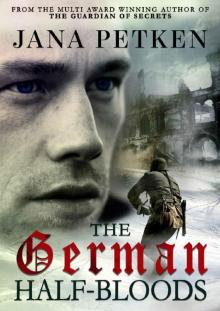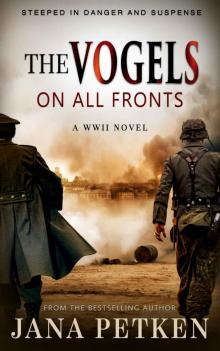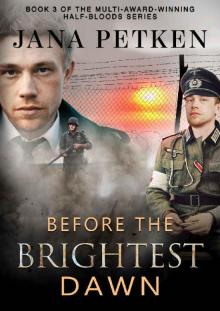- Home
- Jana Petken
Swearing Allegiance (The Carmody Saga Book 1) Page 30
Swearing Allegiance (The Carmody Saga Book 1) Read online
Page 30
Anna shouted again. “We need to see him before those trains leave!” Without waiting for Jenny’s answer, she began ploughing her way through the crowd. Jenny followed, cursing under her breath at the ungentlemanly behaviour of some men, refusing to allow them to pass. Anna was as stubborn and as hard-headed as Danny, Jenny thought, trying to keep up. She was surprised the two of them got on together, for Danny didn’t generally like women who were quick with their tongues. Sure, for years, he hadn’t liked his own sister!
She felt her arm being gripped. “Jenny, we’re almost there. Hurry up!” Anna yelled.
Jenny felt herself being pushed along by people behind her. She squealed when her foot was trampled on. Then someone’s bony elbow hit her injured arm.
Her eyes watered with pain. “Anna, if we are not on that platform in the next five seconds, I’m turning back,” she said.
They eventually made it through a massive arch and onto the platform where trains sat on three different lines. Walking as fast as they could without bumping into people in front of them, they scanned the faces of soldiers who had already boarded, and at those still to board. Jenny halted in mid-step. Two civilian men were arguing about something right in front of her. Unable to get past them, she patiently waited and watched as their anger towards each other grew. She had no idea what they were fighting about, but scenes like these were becoming quite a common occurrence, she thought, mesmerised by their aggression.
Most Londoners were tired and angry nowadays, feeling altogether let down by the war of attrition against Germany. It was all so sad and maddening at the same time. German blockades and food shortages were crippling the population. Every available piece of ground in the capital was being dug up to grow whatever was possible to feed the people. Children as young as five years old were in the streets alongside adults, on their hands and knees, tearing up the ground, along with the very fabric of British society. City streets were looking more like giant cabbage patches, and women looked like a bunch of farmers with filthy faces and muddy aprons. But no one cared about such things, just as long as they had enough to eat.
Even with the latest battles going on, no side was winning, losing, or making any significant breakthroughs, no matter what the government said. On her last visit to the hospital, she had heard men talking about their despondency. “Going off to war is like a three to one gamble of coming home alive,” one man had said. Another corrected him. “It’s two to one, if you count getting wounded.” And then something they had all agreed upon: one or the other had to be better than the steady, slow destruction from sniper fire and random shells in trenches, stretching from the Belgian coast to the Swiss border. Nothing bolstered a man’s resolve like a victory, she thought, or brought the country together when confronted by defeat. And nothing killed morale more than waiting around. She should know.
Eventually, the two men stopped shouting and went their separate ways. Jenny did a 180-degree turn, looking but failing to find Anna. She’d lost her.
Chapter Forty-Nine
Danny hung his head out of the open carriage window and desperately searched for Anna. She should be there to see him off. He’d sent the telegram from a post office in Nottingham two days previously, warning her about his departure. That had come as a bit of a shock to him, really. His training had lasted four months. He’d been told six, and that afterwards there would be a few days’ leave to say his goodbyes to family, but no, it seemed that the army needed every man capable of shooting a rifle now, regardless of training schedules. He was scared, not ready for war, and no Irish blarney or good-humoured banter could quite mask his fear of what was to come. It was one thing to be called an infantryman and quite another to actually be one in a combat zone.
“Move your bleedin’ head, Carmody. Give us a look!”
Danny felt his greatcoat being tugged from behind by the man shouting at him. The window was not big enough to allow all of the men inside the carriage to have a decent view of the platform, but he’d fight tooth and nail to stay where he was.
“Find your own bloody window. I’m not moving till I see my wife!” Danny shouted back.
Ten minutes passed, and Anna’s face had not appeared in the crowd. Envious, he watched husbands kiss their wives goodbye on the platform and through open windows farther down the train. It was too late for him. He couldn’t get off now even if he pushed his way through the wall of men standing in his way. On the platform, train guards were blowing whistles. The noise of the engine was growing louder, and steam rising from the smokestack was fogging up the air. The train was departing.
Men behind Danny were becoming even more agitated, knowing that they only had a minute or a few seconds to glimpse a loved one. The men who had been lucky enough to say their farewells gave others their places at the windows, but Danny wasn’t budging for the devil himself.
Multiple hands pulled at Danny’s back. Enraged, he shouted, “Get off me, ya bunch of feckers!” Clinging on to the windowpane for dear life, he cursed the men to hell and back, until his fingers slipped from the glass. Within seconds of being free, he tumbled rearwards onto the carriage floor, banging his head on the side of a seat as he fell. Afraid of his chest being crushed by boots, he awkwardly turned over, grabbed hold of the nearest seat, and pulled himself up. Standing up, he found himself in the aisle flanked by men five deep. Most were still craning their necks to see outside. And if things were not bad enough, the train jerked, swayed, and then huffed and puffed before slowly moving down the tracks and out of the station.
Defeated, he sat on the edge of a seat and watched his fellow soldiers settle down. When asked to shove up, he refused to move his backside from the little bit of bench he’d claimed and instead closed his eyes in disgust. Would he ever see Anna again? Had his chance to touch her sweet lips and hear her voice been taken from him forever? And what of civilisation? Was that gone too? Probably. He’d more than likely get his head blown off on the Western Front. That seemed to be the order of the day for most, by all accounts.
Southampton was as hectic as Patrick had described it to be on his last leave. Upon his arrival at the dockyard, Danny formed up with his unit in one of the lines of four. No one seemed to walk about in the army, he thought. It had been the same when he’d trained with the Irish republicans. Everyone marched everywhere in regimented lines. Nobody took a casual stroll about the place.
Passing one ship after another, he marvelled at the array of so many diverse-looking vessels. Some were undergoing routine maintenance. Many of the ships were already brimming with troops on their decks. But it wasn’t only the ships that drew his eyes. The entire length of the jetty was filled with trucks, tanks, heavy artillery, and buses. Why the hell were they sending buses to the Western Front? he wondered.
His eyes then caught sight of much larger ships on parallel jetties, some distance from his position. Before arriving there, he had been made aware of the dockyard’s enormous size. He had held out hope but hadn’t been optimistic about seeing where the hospital ships were docked. His spirits rose in anticipation. The red crosses painted on their sides were clearly visible, and where there were hospital ships, there might be a certain brother of his.
“How long do you think we’ll be here for before we push off?” he asked the man next to him.
“How the bleedin’ ’ell should I know? Do I look like a pansy sailor? And the term ain’t ‘push off’. It’s settin’ sail or somethin’ or other,” the man answered.
Danny chuckled. He liked Jack. He was a hard man, an experienced soldier from the Boer War and an excellent marksman, but he seemed much too old to go into battle again. Danny couldn’t understand why he wanted to.
“My brother’s here, Jack. As I told you, he’s a medical naval officer,” Danny said. “See those hospital ships over there?”
“The big ones with crosses? They’re much too far away. You won’t have time to get across there, son.”
He might be right, Danny thought, but if a messag
e could be given to someone who had a truck or van, that someone might find Patrick for him. Damn it, he wanted to see his brother.
Glancing to his left, Danny saw his sergeant major marching alongside the column. Nudging Jack, he said, “Be a good man and ask the sergeant how long we’re going to be here for, will you? He won’t shout at you. Sure, even he’s scared of you.”
After getting a ticking off for talking on the march, Jack was told that the weather at sea was holding the ships’ departures up for at least six hours. Nothing was crossing the channel until new orders came through. The sergeant also mentioned that it was snowing in France.
After embarking, Danny thought it might be too risky to try to get off again in search of Patrick, but soon after he’d found a spot on deck near the gangway, he saw a truck pulling up on the jetty. Danny watched and waited until finally a sailor got out of it and then came aboard.
Danny followed the man to a bulkhead door on the main deck but didn’t manage to reach him before he went inside. He waited for a while, and eventually the sailor reappeared. After being asked to do the favour, the man surprised Danny by agreeing to deliver the note that Danny had hastily written. It was addressed to Lieutenant Carmody, base medical liaison officer. I’m here. Danny, it read.
“It’ll only take me five minutes to get over there, but I can’t wait around for too long looking for the lieutenant,” the sailor said. Then he told Danny to stand at the gangway and not to move from there. “I can’t promise, mind you, but if I do find him, I’ll make sure he gets here.”
A half hour passed and then an hour. Many of the troops had already gone below decks to get out of the biting wind. Danny was freezing. It was beginning to get dark, and any scrap of heat from the sun had gone. He was just about to look for a more sheltered spot when he saw the lights of a truck. Staring at it, his hope plummeted. It was not the same truck, but nonetheless he stood a moment longer to watch who got out. Then he saw Patrick striding towards the gangway in full uniform, gold rings on his sleeves and peaked cap on his head. He was a grand sight.
After embracing for a tad longer than would be thought manly, Danny held Patrick at arm’s length, and gave his shoulders an affectionate shake. “You took your time getting here. My feet and hands are numb,” he said.
Patrick grinned. “Stop your griping. I’m here now, and you’re a welcome surprise for my sore eyes.”
Patrick should hear about everything that gone on at home, Danny thought, but he didn’t have much time to get it all out. Words tumbled from his mouth so fast he had barely enough time to draw breath between sentences. He spoke about the wedding and about how much he loved his wife. He recited the story of how he came to be serving in the British Army, embellishing it a little with an account of how he had nearly killed the two men who had attacked their sister. He mentioned all of the family members and how they were; then he made Patrick promise to look after Anna should he die in France.
“Should my dead body make it home, I want you to see to its burial in Ireland. Put me next to our dad,” he said.
Patrick’s eyes clouded over. “You’re too much of a rebel to die fighting for the British. Put that out of your mind, Danny. Just think about coming back in one piece.”
Danny, also overcome with emotion, said, “There is another important matter. It concerns Jenny and Kevin. Mam will kill me if she finds out I’ve told you, but what the hell difference does that make now! I need to clear my conscience, and you need to promise me that you’ll sort this out, one way or another.”
The story was told systematically, and at each juncture, Patrick became angrier and angrier, until Danny thought his brother would burst a blood vessel in his face. Ending the story with John’s visit, he said, “I was up the stairs, not being well, but I heard John saying that Jenny was ugly and that no one would have her. I think that was the reason she never wrote to Kevin. She once told me that she was doing him a favour.”
“Do you think she has feelings for Kevin, then?”
“I know she does.”
“Women are such strange creatures. Jenny might have shot herself in the foot. I’ve not seen or heard from Kevin in nine months,” Patrick said. “I’ve written to him and received no replies. I even wrote to his parents in Kildare, but I’ve had nothing back. Damn John Grant. He’ll get more than a kick up the backside from me if I ever see him again.”
“Do you think Kevin might be dead?”
“I hope not. Jesus, the thought of that begs belief. I know you don’t like him, but he’s the best friend a man could ask for, and he’d have made a bloody good husband for our Jenny. He loved her completely. For years, he spoke of no other woman but her.”
Danny felt shame burn into his cheeks. “I didn’t know …”
“Kevin hid a lot of things about himself and his family – you don’t know the half of it. But we’ll leave that for another time. You did the right thing telling me.”
“No, the right thing would have been to tell Jenny and you when I first found out about what Mam was doing.”
“I’m going home for a visit soon. There will be hell to pay, Danny. You can be sure of that. Mam and Minnie have gone too far, and they’ll not be getting away with what they’ve done. Not this time.”
Chapter Fifty
“I’m delighted to say you are no longer my patient, Miss Carmody. From now on, you will see the nurse on your visits and, on occasion, a junior doctor, who will keep an eye on your progress.”
Dr Thackery smiled warmly at Jenny, as though the announcement held great meaning for him. Jenny, for her part, had mixed feelings about the end of her weekly journeys to Shooters Hill. She usually made a morning out of her appointments by going for tea with Mam or Anna after being treated. Sometimes when she went to the hospital unaccompanied, she took long walks in Greenwich Park before going home. She was rarely allowed to leave the house nowadays when she had no clear reason to, and when she did, there was an almighty row when she got back home.
“How do you feel about this news, Jenny?” he asked, using her Christian name.
She shrugged lethargically. “I suppose I should be happy that I’ve recovered reasonably well, but to be honest, I’ll miss coming here.”
“You don’t have to.”
“Why do you say that?”
Thackery’s penetrating gaze bore into Jenny until she felt her skin tingle with warmth. “Dr Thackery?”
“I have a proposition for you. I do hope you don’t turn me down until you hear what I have to say.”
“No, of course not.”
“Well, I may be presumptuous, and if I am, I apologise, but I feel that I’ve come to know you over the past nine months, and I believe you’re not the sort of woman who enjoys being inactive at home. Am I right?”
“You are.”
“Oh, good. I mean, of course it’s not good that you’re inactive …”
Jenny smiled. He was a large man with a wide girth and round friendly face. His kind expression had always given her a sense of calm, even in the darkest of days. He was known for his humour and easygoing manner with patients, she thought, but at this very moment, he appeared to be extremely nervous about something or other, and he looked like a little boy.
“Dr Thackery, what’s your proposition?” she asked.
“Yes, sorry. The thing is, I can stop your days of boredom. I can’t offer you any wages for the position that I have in mind, as such, but I can promise you that you will find it rewarding.”
“Are you offering me employment?” Jenny thought that strange. Dr Thackery had made it clear on numerous occasions that her condition would not be conducive to most types of work. She was not physically able to lift heavy objects because of a weakness in her damaged arm and the slight tremor in her hand. It had been explained that those problems were due to nerve damage. Nor could she work with any sort of disinfectant or chemicals, which might accidentally burn the skin. She wondered what kind of job he deemed suitable.
“I am offering you a chance to serve your country and help yourself at the same time.”
“I’m listening, but before you say more, I have to tell you that I’m not keen on the idea of being employed without the promise of a wage slip at the end of each week. I don’t know of any person who would be, man or woman.”
“Of course they wouldn’t. Forgive me. I may have phrased that wrongly.” Looking embarrassed, Thackery opened a desk drawer and pulled out a sheet of blank paper. For a moment, he wrote what looked like a list, and then he sat back in his chair.
“You like to read, do you not?”
“I do,” Jenny answered.
“And I know from speaking to you that you’re a very good conversationalist. You take an interest in the war, and I don’t just mean that there is a war, but in governmental issues and military campaigns as well. I’ve heard you speaking to soldiers in the waiting room. So what I’m offering you, in essence, is the chance to become involved in the war effort by helping our patients here to feel cared for, and in return you will be offered full board in the hospital nurses’ quarters and a small sum of money, which will be set aside for you at the end of each week by the hospital board.”
“So I will get wages?”
“Yes, in a manner of speaking. This is not an official post, you understand.”
“I’m not sure I do. I’m not a nurse. I don’t like the sight of blood. Someone once offered me employment in the Charing Cross Hospital, and I told him exactly the same thing.”
“I know that you’re not a nurse, Jenny. You misunderstand me. Our nurses are run off their feet. They lack the time to sit with patients, to talk to them, and to read letters aloud for those who can’t hold the pages. We have many soldiers who are alone and suffering from terrible wounds. You’ve seen them for yourself – men with half their faces blown off and facial skin so badly burnt that they have no discernible features left.”

 Blood Moon
Blood Moon The Guardian of Secrets and Her Deathly Pact
The Guardian of Secrets and Her Deathly Pact Dark Shadows
Dark Shadows The German Half-Bloods (The Half-Bloods Trilogy Book 1)
The German Half-Bloods (The Half-Bloods Trilogy Book 1) Swearing Allegiance (The Carmody Saga Book 1)
Swearing Allegiance (The Carmody Saga Book 1) The Errant Flock
The Errant Flock The Vogels: On All Fronts (The Half-Bloods Trilogy Book 2)
The Vogels: On All Fronts (The Half-Bloods Trilogy Book 2) The Guardian of Secrets
The Guardian of Secrets Before The Brightest Dawn (The Half-Bloods Trilogy Book 3)
Before The Brightest Dawn (The Half-Bloods Trilogy Book 3) Blood Moon (The Mercy Carver Series Book 2)
Blood Moon (The Mercy Carver Series Book 2) Dark Shadows (The Mercy Carver Series Book 1)
Dark Shadows (The Mercy Carver Series Book 1)